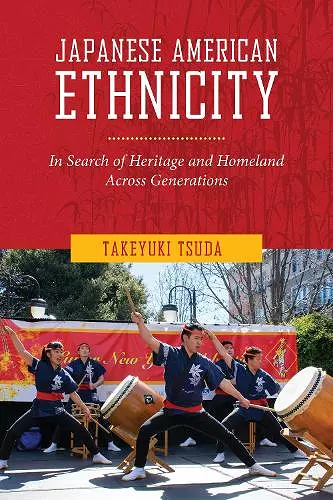Japanese American Ethnicity
In Search of Heritage and Homeland Across Generations
Format:Hardback
Publisher:New York University Press
Published:13th Sep '16
Currently unavailable, and unfortunately no date known when it will be back
This hardback is available in another edition too:
- Paperback£24.99(9781479810796)

Traces the contemporary ethnic experiences of Japanese Americans
As one of the oldest groups of Asian Americans in the United States, most Japanese Americans are culturally assimilated and well-integrated in mainstream American society. However, they continue to be racialized as culturally “Japanese” foreigners simply because of their Asian appearance in a multicultural America where racial minorities are expected to remain ethnically distinct. Different generations of Japanese Americans have responded to such pressures in ways that range from demands that their racial citizenship as bona fide Americans be recognized to a desire to maintain or recover their ethnic heritage and reconnect with their ancestral homeland. In Japanese American Ethnicity, Takeyuki Tsuda explores the contemporary ethnic experiences of Japanese Americans from the second to the fourth generations and the extent to which they remain connected to their ancestral cultural heritage. He also places Japanese Americans in transnational and diasporic context and analyzes the performance of ethnic heritage through the example of taiko drumming ensembles.
Drawing on extensive fieldwork with Japanese Americans in San Diego and Phoenix, Tsuda argues that the ethnicity of immigrant-descent minorities does not simply follow a linear trajectory. Increasing cultural assimilation does not always erode the significance of ethnic heritage and identity over the generations. Instead, each new generation of Japanese Americans has negotiated its own ethnic positionality in different ways. Young Japanese Americans today are reviving their cultural heritage and embracing its salience in their daily lives more than the previous generations. This book demonstrates how culturally assimilated minorities can simultaneously maintain their ancestral cultures or even actively recover their lost ethnic heritage.
In drawing and reflecting upon the voices and experiences of different generational cohorts, Tsuda not only fills a void in Japanese American studies but expands our very understanding of the concept of 'ethnic heritage.' Adeptly parsing processes of assimilation, transnationalism, racialization, and multicultural discourse, Tsuda engages the factors that shape the retention and refashioning of ancestral culture. -- Michael Omi,University of California, Berkeley
Using the keyword `generation, Tsuda deftly explores notions of transnational ethnicity among contemporary Japanese Americans, moving beyond internment to provide an insightful analysis of how modern Japanese Americans have created new identities and communities in the American cultural landscape. -- K. Scott Wong,author of Americans First: Chinese Americans and the Second World War
[The books] main strength is its comparison in ethnic heritage of four different generations of Japanese Americans. None of the previous books on this subject has compared three or more generations in the formation of ethnicity among members of one or more ethnic groups. * American Journal of Sociology *
ISBN: 9781479821785
Dimensions: unknown
Weight: 635g
352 pages